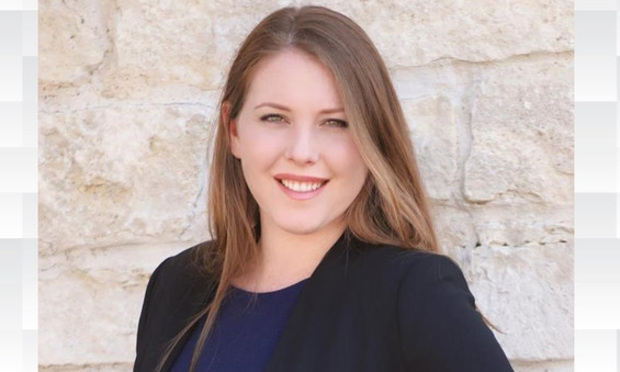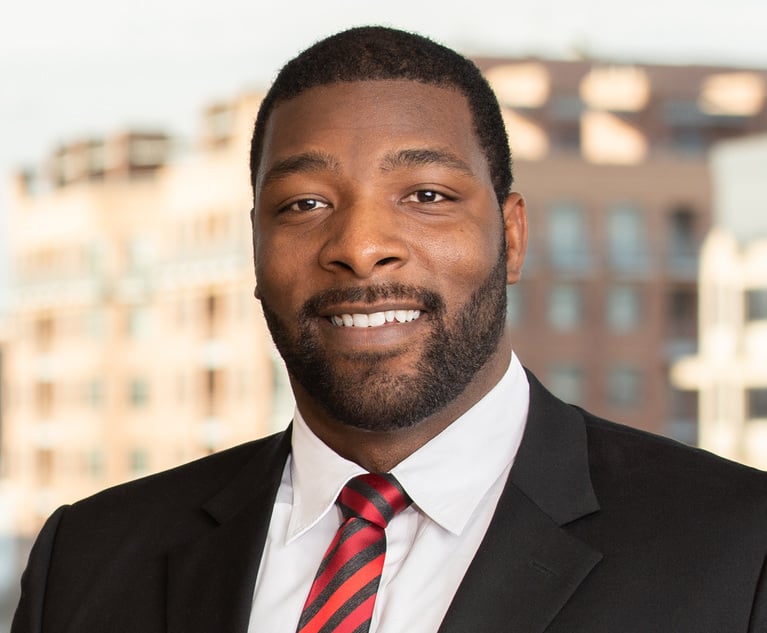Texas Lawyers Facebook Group, With 1 Million Interactions, Has Become State's Largest Volunteer Bar Association
“You can press 'send' and literally talk to 11 percent of the lawyers in Texas. It's crazy,'' said Scott Rothenberg, a Houston appellate attorney who participates in the group.
November 26, 2018 at 02:00 PM
7 minute read
 Jnana Settle. Courtesy photo
Jnana Settle. Courtesy photo
In February, a potential client approached second-year lawyer Jnana Settle with a difficult legal question she couldn't answer: Had an employer violated privacy laws by telling all of the potential client's co-workers that she had been out with shingles?
This would have been an easier question for Settle to handle a year ago when she worked in a big downtown Dallas law firm—a mere walk down the hallway to a more senior lawyer's office for consultation would have lead her in the right direction. But now that Settle is making her way as a solo practitioner in suburban Murphy, there are no other lawyers within shouting distance to ask.
So she turned to Facebook, specifically the Texas Lawyers Facebook group, where she posted the question. Within minutes Settle received answers from 20 different different Texas attorneys—most of them concluding that the illness wasn't embarrassing enough to warrant legal protection. Settle ultimately decided to refer the client to an employment attorney.
Settle's not alone in consulting social media for tricky legal questions. The Texas Lawyers closed group has over 11,000 members who have answered more than 1 million interactions on thousands of questions since it began on Facebook in 2014. The group has been a huge help to young solos seeking guidance, she said.
“Because there are so many lawyers coming out of Texas law schools, and there are not jobs for them, there's no hallway. The Facebook group is the hallway,” Settle said. “That's the focus of the group. They are priceless for asking about judges and procedure.''
Settle's experience is exactly what Houston mediator Andrew Tolchin had in mind when he started the group four years ago. He envisioned the group as a place where less-seasoned lawyers could seek advice from veteran Texas lawyers all over the state in a private, judgement-free zone. And hopefully the answers will educate many more attorneys other than the one asking the question, he said.
“Collectively, what I see in the group, I call it peer review mentorship. That's a term of art I have created—the questions can be asked and responded to in front of everybody,” Tolchin said. “So a question asked by one person can actually train many in real time, whether it's from your living room or your office or wherever you happen to be at the moment.”
What's going on in the Texas Lawyers Facebook group is what is supposed to be happening in traditional bar associations—they just do it faster and without bar dues, he said.
“There's an old world way of thinking that a bar association consists of people that are in the same room,” Tolchin said. “What I have found, and what this model has proven, is that a bar association is nothing more than attorneys associating with respect to some nexus. Here, this closed group that can't be directly viewed by the public is that nexus. And it's a cost-free nexus.”
To be admitted to the group, a person must have a Texas bar card and provide his or her license number. If there's any confusion about admission to practice in the state, Tolchin will personally call an applicant before admitting him or her into the group. The group is also heavily moderated by Tolchin, Michelle Cheng, and Jason Rowe who serve as the group's co-administrators.
“Politics, advertising and spam we don't allow. You can't say: 'Hi. I'm attorney so and so, please send me your PI cases,'” Tolchin said. “But what happens is, if someone asks PI questions, and a PI attorney answers those questions well, they are going to get referrals because they demonstrated skill.''
While Texas Lawyers Facebook group has no formal association with the State Bar of Texas, it is comprised of 11 percent of the Bar's membership. The group is now larger than both the Harris County Bar Association and the Dallas County Bar Association, and its membership is growing every day. It is the largest volunteer bar association in the state.
“You can press 'send' and literally talk to 11 percent of the lawyers in Texas. It's crazy,'' said Scott Rothenberg, a Houston appellate attorney who participates in the group.
When the group got that big, Rothenberg began having concerns about the ethics of the social media group's operations.
Earlier this year, Rothenberg posed a question of his own—to the State Bar of Texas' Professional Ethics Committee: could lawyers use the Facebook group for the benefit of their clients without running afoul of the Texas Disciplinary Rules of Professional Conduct?
The committee's answer was a qualified yes. They blessed lawyers' use of attorney internet forums to get answers to tricky legal questions, as long as the query does not give up too much information about their clients' identity.
The opinion pointed out that Disciplinary Rule 1.05 prevents lawyers from knowingly revealing confidential information about a client, and Rule 1.05(a) broadly defines the term “confidential information” as all information protected by the attorney-client privilege, as well as some unprivileged information provided by the client or acquired by the lawyer during the representation of the client.
However, not all lawyer-to-lawyer consultations involve the revelation of confidential information, and inquiring lawyers may consider it necessary to provide a certain amount of factual context to obtain useful feedback.
And the opinion notes that disciplinary rules have several exceptions when it comes to revealing unprivileged information about a client, including Rule 1.05(d)(1), which allows such revelations when a lawyer is authorized to do so in order to carry out the representation; and Rule 1.05(d)(2), which allows it when an attorney has a reason to do so to carry out the representation effectively.
“The Texas Disciplinary Rules of Professional Conduct do not categorically prohibit informal lawyer-to-lawyer consultation for the benefit of a client, whether the consultation occurs in an online discussion group, an in-person meeting, or otherwise,” the opinion states. “However, inquiring lawyers must honor their duty of confidentiality.”
“If possible, the inquiring lawyer should limit such consultation to general or abstract inquiries that do not disclose confidential information relating to the representation,” the opinion continues. “If it is not reasonably possible to address the issues in question using a general or abstract inquiry, a lawyer may reveal a limited amount of unprivileged client information in a lawyer-to-lawyer consultation, without the client's express consent, when and to the extent that the inquiring lawyer reasonably believes that the revelation will benefit the inquiring lawyer's client in the subject of the representation.”
Rothenberg, who teaches CLE courses on legal ethics, regularly warns attorneys that they can't rely solely on advice they get in forums in answering a client's legal question.
“It's a great starting point and it can save you time performing the initial research,” Rothenberg said. “But after looking at the answers provided over the course of two years, I would absolutely not to rely on those answers as the gospel truth all of the time.''
Rothenberg also cautions that the answers provided in the Facebook group are sometimes wrong. And no lawyer wants to tell a client they made a legal mistake based on something read on the internet.
“The best way to describe it—if you look at the ethics rules, there is nothing against the rules if a lawyer wants to go to a trial wearing a salmon as a neck tie,” Rothenberg said. “It's not against the rules. But that doesn't make it a good idea.''
This content has been archived. It is available through our partners, LexisNexis® and Bloomberg Law.
To view this content, please continue to their sites.
Not a Lexis Subscriber?
Subscribe Now
Not a Bloomberg Law Subscriber?
Subscribe Now
NOT FOR REPRINT
© 2025 ALM Global, LLC, All Rights Reserved. Request academic re-use from www.copyright.com. All other uses, submit a request to [email protected]. For more information visit Asset & Logo Licensing.
You Might Like
View All
State Bar Ethics Opinion Determines Texas Lawyers Can't Join a Firm With Non-Lawyer Partners
2 minute read
Jones Day Names New Practice Leaders for Antitrust, Business and Tort Litigation and Latin America


Haynes and Boone Expands in New York With 7-Lawyer Seward & Kissel Fund Finance, Securitization Team
3 minute readTrending Stories
- 1CFPB Labor Union Files Twin Lawsuits Seeking to Prevent Agency's Closure
- 2Crypto Crime Down, Hacks Up: Lawyers Warned of 2025 Security Shake-Up
- 3Atlanta Calling: National Law Firms Flock to a ‘Hotbed for Talented Lawyers’
- 4Privacy Suit Targets Education Department Over Disclosure of Student Financial Data to DOGE
- 5Colwell Law Group Founder Has Died in Skiing Accident
Who Got The Work
J. Brugh Lower of Gibbons has entered an appearance for industrial equipment supplier Devco Corporation in a pending trademark infringement lawsuit. The suit, accusing the defendant of selling knock-off Graco products, was filed Dec. 18 in New Jersey District Court by Rivkin Radler on behalf of Graco Inc. and Graco Minnesota. The case, assigned to U.S. District Judge Zahid N. Quraishi, is 3:24-cv-11294, Graco Inc. et al v. Devco Corporation.
Who Got The Work
Rebecca Maller-Stein and Kent A. Yalowitz of Arnold & Porter Kaye Scholer have entered their appearances for Hanaco Venture Capital and its executives, Lior Prosor and David Frankel, in a pending securities lawsuit. The action, filed on Dec. 24 in New York Southern District Court by Zell, Aron & Co. on behalf of Goldeneye Advisors, accuses the defendants of negligently and fraudulently managing the plaintiff's $1 million investment. The case, assigned to U.S. District Judge Vernon S. Broderick, is 1:24-cv-09918, Goldeneye Advisors, LLC v. Hanaco Venture Capital, Ltd. et al.
Who Got The Work
Attorneys from A&O Shearman has stepped in as defense counsel for Toronto-Dominion Bank and other defendants in a pending securities class action. The suit, filed Dec. 11 in New York Southern District Court by Bleichmar Fonti & Auld, accuses the defendants of concealing the bank's 'pervasive' deficiencies in regards to its compliance with the Bank Secrecy Act and the quality of its anti-money laundering controls. The case, assigned to U.S. District Judge Arun Subramanian, is 1:24-cv-09445, Gonzalez v. The Toronto-Dominion Bank et al.
Who Got The Work
Crown Castle International, a Pennsylvania company providing shared communications infrastructure, has turned to Luke D. Wolf of Gordon Rees Scully Mansukhani to fend off a pending breach-of-contract lawsuit. The court action, filed Nov. 25 in Michigan Eastern District Court by Hooper Hathaway PC on behalf of The Town Residences LLC, accuses Crown Castle of failing to transfer approximately $30,000 in utility payments from T-Mobile in breach of a roof-top lease and assignment agreement. The case, assigned to U.S. District Judge Susan K. Declercq, is 2:24-cv-13131, The Town Residences LLC v. T-Mobile US, Inc. et al.
Who Got The Work
Wilfred P. Coronato and Daniel M. Schwartz of McCarter & English have stepped in as defense counsel to Electrolux Home Products Inc. in a pending product liability lawsuit. The court action, filed Nov. 26 in New York Eastern District Court by Poulos Lopiccolo PC and Nagel Rice LLP on behalf of David Stern, alleges that the defendant's refrigerators’ drawers and shelving repeatedly break and fall apart within months after purchase. The case, assigned to U.S. District Judge Joan M. Azrack, is 2:24-cv-08204, Stern v. Electrolux Home Products, Inc.
Featured Firms
Law Offices of Gary Martin Hays & Associates, P.C.
(470) 294-1674
Law Offices of Mark E. Salomone
(857) 444-6468
Smith & Hassler
(713) 739-1250






